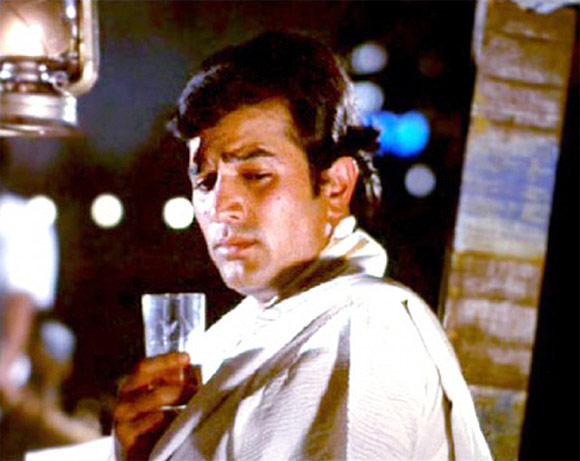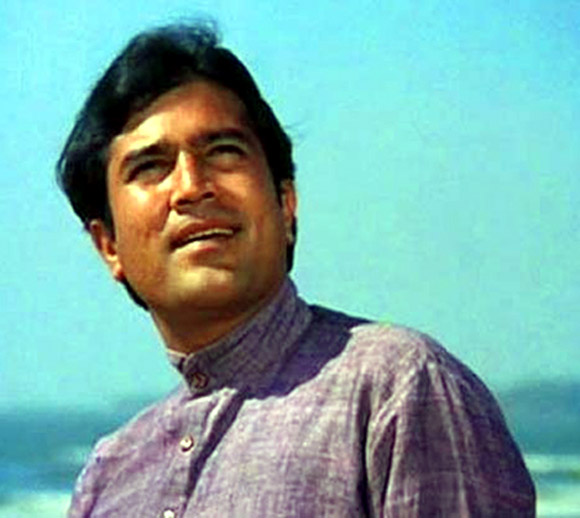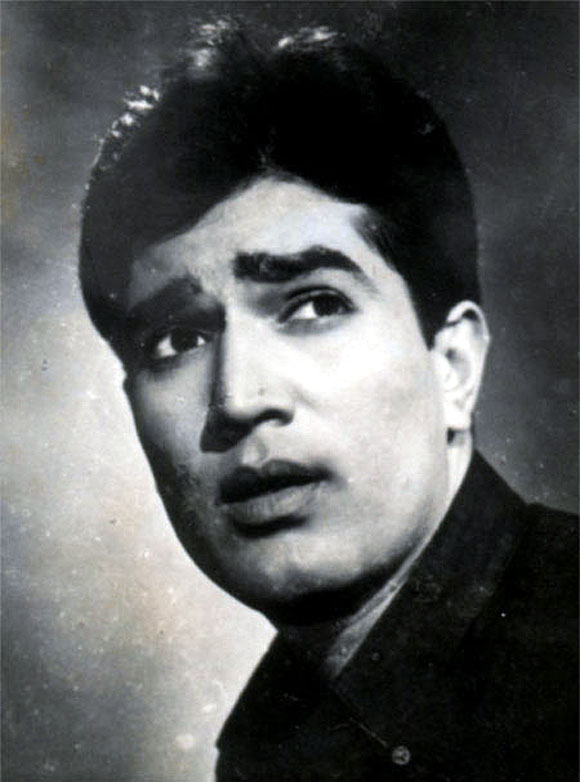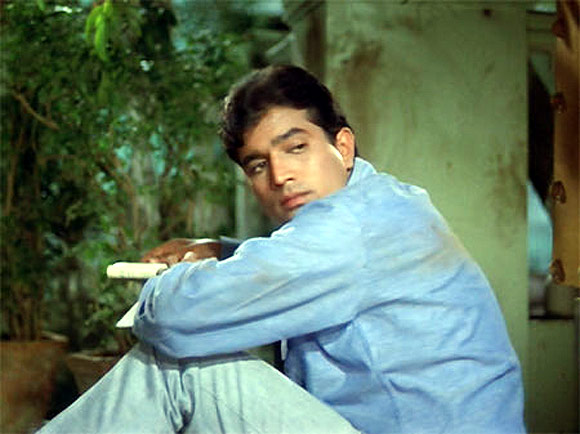
Arthur J Pais remembers the late superstar and a bottle of Johnny Walker Black Label that he found waiting in his Chennai hotel room, a gift from the late legend, as he prepared to meet a writer.
The Johnny Walker Black Label was delivered to a hotel room in Chennai where I was meeting with writer Shabd Kumar, a former editor of Film Journal who had suddenly found fame with Insaf Ka Tarazu.
The film was produced and directed by B R Chopra and starred Zeenat Amman, Padmini Kolhapure in lead roles. The rape and revenge drama was 'inspired' by the Hollywood hit Lipstick.
While many critics had slammed Kumar for getting 'inspired' by Hollywood, his stock was rising throughout 1980 and it seemed that for some time everyone in town wanted him to write a film for them.
Rajesh Khanna had brought him to Chennai to discuss a project or two in between the other businesses the star and producer had with the producers and directors in the city.
When Rajesh heard that I was spending a few hours with Shabd, he sent the whiskey and suggested that I meet him "soon."
Rajesh Khanna did not know me personally and I wondered whether he had read anything I'd written. My stories on cinema, movie stars, politicians, and temples, churches and travel were mostly South-oriented and they ran mainly in the weekly publication Sunday, which was edited for over a decade by M J Akbar, and Filmfare, edited by Bikram Singh.

My weekly gossip column was very tame compared to what people like Devi (Devyani Chaubal) were putting out in Mumbai publications, but there were many people in Mumbai who were curious about me.
Sunday had gossip pages facing each other. Akbar had given me the pen name 'Piousji' -- he thought it sounded sexy. "That should suit you fine, though you are anything but pious," he used to say.
The Mumbai gossip page was credited to Shirji. I had no idea who that person was. A year or so after I started writing for Sunday, the Shirji byline disappeared. I was told the page was buying gossip from many sources, hence no one byline. But my name remained at the end of page 2.
"How do you get all that gossip from Bombay (as Mumbai was then known)" Hrishikesh Mukherjee, the director (who was also a friend of Rajesh having directed him in three films including Anand) once asked me when he was visiting Chennai for an awards event. "Do you travel to Bombay every week?"
The two pages could not have been dissimilar in content and style. There were too many scandals in Mumbai and the stories from there were bolder and breezier. And yet there were many people who believed I wrote the two pages that also carried in the Bombay section the high scandals in Rajesh Khanna's life. Perhaps he was also curious to know this Piousji!
I shamelessly drank most of the Johnny Walker but it took me a couple of days to realise that I had broken a sacred principle and I was overwhelmed with guilt and shame. Rajesh Khanna might not have suspected even for a femtosecond the effect of his gift.

Rajesh Khanna was then working for Bharati Raja's Red Rose. Like most films made in the South over the decades, it was a remake of a Tamil hit. He was also checking out a number of hit Tamil films, especially the high voltage Sivaji Ganesan films, and discussing the possibility of starring in their Hindi versions.
Many producers believed the best years were behind the 37-year-old star because all those traits that had endeared him to millions -- the wink, the slouching of shoulders, the radiant smile and stylish dialogue delivery -- had become a liability because of overuse.
And, yet, they were prepared to make films with him if he cut down his remuneration and helped the films complete on time. "One hour late coming, no problem," a producer in Chennai told Rajesh, notorious for keeping his directors waiting for three to four hours, "but more the waiting, more trouble for the fillum."
Halfway during the screening of a Tamil film featuring Sivaji Ganesan, Rajesh Khanna ran out of the screening room, according to one of the southern star's sons, overwhelmed by Ganesan's highly theatrical emotions. "I cannot do this. I cannot do this film. I cannot act like him," Khanna reportedly said.
The producer, who was contemplating a Hindi version, was more than happy. "He is very humb#8804 he came back into the room and saw the full fillum. He will do it," he said of Rajesh Khanna. I have forgotten the title of the Tamil film and I don't know if it was remade at all -- and with Rajesh.
Rajesh Khanna was very fond of southern audiences, especially the Tamils who had made his film Aradhana run for nearly 18 months in a 350-seat theatre in Chennai. The film ran for more than eight weeks in some 20 cities in Tamil Nadu.

He told a journalist that the hundreds of "girls" who "married" his portraits or movie posters came from all over the country and he received letters threatening suicide if he did not marry them, but he received the largest number of rakhees (after the success of Sacha Jhoota with its famous song, Meri pyari bahenia...) from his "sisters" in Tamil Nadu.
Throughout the eighties, he kept coming back to Chennai often and did work in the remake of many hits. His best days might have been over but he was still featured in over half-a-dozen successful films including Dharam Kanta (sharing the screen with Rajkumar and Jeetendra), Avtaar and Souten. A handful of films were made in Chennai, like Masterji.
His own film Jai Jai Shiv Shankar, his last effort to salvage his production company which had been brutally hurt by the failure of Alag Alag, was directed by a Chennai-based man.
His most successful film was Sandow Chinnappa Devar's Haathi Mere Sathi made in Chennai. It was the beginning of Rajesh Khanna's invincible super success story.
It featured Tanuja and a number of elephants and tigers and was a smash hit not only in India but in countries such as the Soviet Union, Egypt and all of Africa's East Coast and in Nigeria, too.
Even today, Ethiopian cab drivers in Toronto, Nigerians in New York and London, and the Somalian cabbies in Minneapolis, who were not born when the film was first released, hum its title song and go out of their way to help a desi who can make conversation about Rajesh Khanna.
"The best elephant boy in the world," an Ethiopian cabbie told me during the Toronto International Film Festival a couple of years ago. "They must bring him to Toronto with Amitabh and Shah Rukh Khan."

While Rajesh Khanna was busy watching hit South Indian films and discussing an edgy project with Shabd Kumar -- which never took off -- I was feeling guilty about accepting the Scotch.
Over the years, I had scrupulously avoided cocktail chat with the people I was going to write about, especially with the movie stars, industrialists and politicians.
I used to heap scorn on journalists who went to producers' or movie stars' homes around Diwali and came out trying to hide a bottle in the crook of their arm.
A few months before I had succumbed to Rajesh Khanna's whiskey, I had refused a dinner invitation from Kishore Kumar who was in Chennai to shoot a swimming pool song with the popular Telugu star Jayasudha for Shabash Daddy.
I did not like the idea of someone spending money for dinner at a five star hotel. I think I was also afraid, given Kishore's reputation for being a world class kanjoos (miser), that he might make me pay for two dinners!
Once Sivaji Ganeshan almost ordered me to drink whiskey with him. He was surprised that he had met a journalist who did not drink. "I love to drink," I had confessed. "But I do it at home and in front of my typewriter." But that courage had abandoned me when the Johnny Walker bottle arrived.
I bought -- in black and needless to say at an exorbitant price -- a Johnny Walker Black Label from the same hotel where Rajesh and Shabd Kumar were staying, and gave it to the writer, along with mithai, to be given to Rajesh Khanna. My card accompanied the 'gifts.'
About four days had passed since Rajesh had said he wanted to meet me. Now, there wasn't a whisper of any such meeting, and that suited me. I was preparing to leave India for graduate studies in journalism at an American university (alcohol, I would leave after a few years). The whiskey and mithai cost me nearly half my monthly salary.
A few years later, a friend wondered why I had not left the bottle and the sweets at the hotel reception to be given to Rajesh Khanna. "What if Kumar had forgotten to give it to Khanna?" he said with a wink.